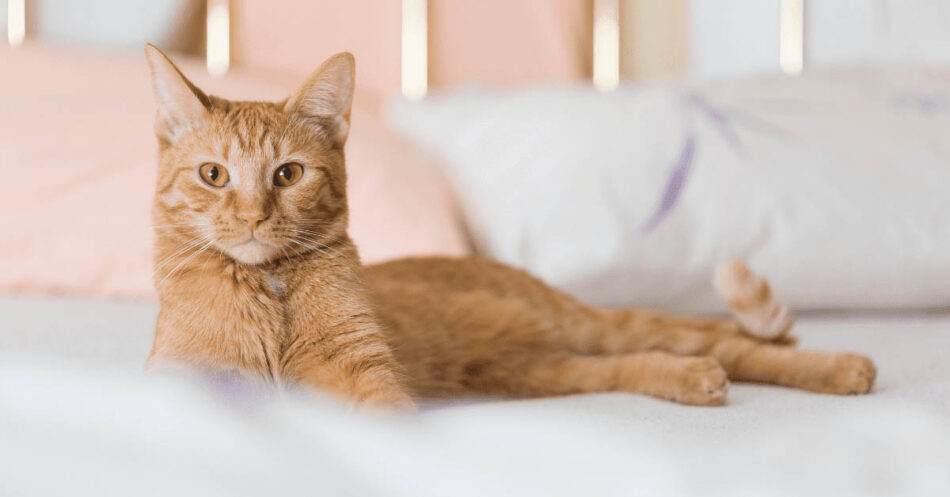
How to Stop a Cat from Spraying Indoors
This post may include affiliate links. Please read my disclosure policy.
Spraying, or marking, is something not all cats do, but when yours decides to call out a spot in your house for his personal marking, it’s hard to think of a more offensive cat behavior.
My cat, Max, was a sprayer. And of all the places he picked to mark his territory, it was my stovetop! The smell permeated everything to the point where I couldn’t even use my oven or stovetop for quite some time.
What Is Spraying?
Your cat sprays to mark his territory, much like some dogs will urine mark. But what’s the difference between cat spraying and urine marking?
Essentially, it’s in the position your cat assumes. When it comes to cat spraying, cats will back up to a standing object. It might be a wall, a chair leg, or another piece of furniture. They raise their tail erect and squirt urine, usually on vertical surfaces.
When cats urine mark, they’ll squat just as if they’re peeing normally and they’ll do this on a flat surface, like your carpet or your bed.
In both scenarios, the behavior is intentional and not a matter of their inability to “hold it.” It’s purely a behavioral issue.
What about female cats? Do female cats spray? Yes, female cats spray too. This behavior is not limited to male cats. Although I’ve never had a female cat that sprayed, it’s fairly common.
But why do cats spray?
Why Does Your Cat Spray
There are several possible reasons for cat spraying. Take a look below and see which resonates with your cat. And remember, there could be more than one reason, as was the case with my cat, Max.
Spraying Reason #1: Stress
Cats are most certainly creatures of habit. Have you changed anything in your cat’s environment? What about his routine? In Max’s case, we had recently moved into an apartment while we were waiting for our house to be built.
Just like how humans cope with stress by engaging in certain soothing rituals, cats may use urine marking, or spraying, to relieve their stress by marking out their boundaries. They may try to self-soothe by creating their own “safe space.” This is one way that cats communicate their stress to humans.
So think about your life recently. Have you moved? Have new family members been brought into the home? Has your routine changed?
Spraying Reason #2: Medical Issues
If your cat has stopped using all the litter boxes you have in your home or if he urinates right in front of you, it’s time to see your veterinarian. A urinary tract infection may be responsible for abnormal urination behavior.
Kidney disease may also change urinary habits, including frequency of urination.
Since cats can’t verbalize when they’re in trouble, they may use changed behavior to signal to you that something is wrong and they’re experiencing a medical problem.
Spraying Reason #3: New Pets
In Max’s case, it wasn’t just that we had moved into a new apartment; it was also that he was sharing this new space with two other male cats. And while they weren’t new to him, he felt it important to stake out his turf in our new digs.
If you’ve recently adopted a cat, dog, or another animal, your cat may be feeling threatened and may simply want to establish that this is his territory. He may also be upset when he sees outdoor cats or other animals outside his home, hence the behavior.
And if you’ve thought sharing a litter box was fine, think again! Cats need a lot more “bathroom space” than they’re often given.
Just how much? Dr. Liz Bales recommends one litter box per cat plus one. So if you have multiple cats, you’ll need the same number of litter boxes plus one!
Check out the rest of her litter box secrets here, which can be particularly helpful if you have a multi-cat household.
Spraying Reason #4: Your Cat Isn’t Neutered
Do neutered cats spray? An indoor cat that isn’t spayed or neutered will have a strong desire to spray or mark their territory. Get your cat spayed or neutered before they’re five months old. Most of the time, this prevents urine marking behavior from developing in the first place.
If you’ve adopted an older cat, you can still get him neutered, and most of the time, this will end urine spraying behavior.
How to Stop Your Cat from Spraying
Did you discover the reason for your cat’s indoor urine marking? Now it’s time to match the spraying cause to the spraying solution!
Spraying Solution #1: Curb the Stress
If you’ve recently moved, it may take some time for your cat to feel comfortable in his new home. Start by providing small boundaries for him, perhaps giving him access to one room or a small section of the home to start.
If a new person has been introduced into the family, make sure to give them and your cat plenty of time to bond through positive experiences.
Another thing that might be causing stress to your kitty is a change in his routine. The changes may be subtle to you, but anything that disrupts a cat’s routine can cause them to feel anxious.
A consistent schedule for feeding, play, and affection reduces stress and anxiety in cats, which are common triggers for spraying. Having stability in your cat’s life will make him feel more secure in his environment, lessening his need to mark territory through spraying.
If your indoor cat, particularly if he’s an intact male cat, starts spraying near doors or windows, it’s often because he’s stressed by outdoor cats or animals near his home. You can help him by blocking his view of the outside by using curtains or blinds or moving cat trees near windows somewhere else that he’ll be comfortable with. This reduces his stress by preventing him from seeing the animals that are upsetting him.
In addition, pheromone therapy can produce wonderfully calm behavior in cats. I use this diffuser from Feliway in my house. It emits pheromones that mimic those of a nursing cat mother, calming your cat naturally.
For more about pheromone therapy, see this post from Dr. Liz Bales, the “Cat-vocate.”
Other natural and effective therapies that can be used during transitional periods include Zylkene. This capsule is lactose-free and contains a naturally soothing milk protein. It’s safe for both short- and long-term use, so it’s perfect if your cat just needs to get over the “hump” or if the situation is long-lasting.
Spraying Solution #2: See Your Veterinarian
If your cat’s inappropriate urination is related to a medical condition, it’s important to see your veterinarian right away. Kidney disease and urinary tract infections are nothing to play around with, so be sure to book an appointment immediately.
If you need a refresher on kidney disease symptoms, please read this post.
Spraying Solution #3: Help Your Pets Adjust to Each Other
Often, this is just a matter of time. But don’t force the issue! Remember, multiple cats shouldn’t share a litter box, and make sure each box is sized appropriately for each cat.
The ideal size for a litter box can be measured from the length from your cat’s nose to the tip of his tail, plus another fifty percent. And most cats prefer a non-hooded litter box. This is the one I used for my cat, Olivia.
Spraying Solution #4: Neuter or Spay Your Cat
Remember, most spraying behavior can be eliminated by getting your female or male cats spayed or neutered. Aside from that, spaying or neutering your cats will reduce the risk of reproductive cancers and decrease aggressive behavior. Thus, spayed female and neutered male cats live longer, healthier lives.
You can do this even at five months old, and typically your cat will never start spraying in the first place.
Spraying Solution #5: Use a Cat Spraying Deterrent
If you’ve tried all the solutions above without success, then it’s time to try a deterrent spray! Cats are naturally repelled by certain essential oils and odors, like the ones contained in this deterrent spray. It’s safe for most surfaces and won’t leave any stain marks behind. You can even use it on your plants!
Spraying Solution #6: Switch Your Litter
If you have plenty of enrichment toys and cat trees and there are more than enough litter boxes in your home, maybe the problem with your cat’s urine spraying is with the litter she uses.
If you’ve been following me for a while, then you know I love World’s Best Cat Litter™. Their Attraction Action® Formula is specifically made for kitties who are having trouble or just flat-out refusing to use the litter box. This high-performance litter has a natural, plant-based additive that safely draws your cat to the box. Try Attraction Action® to stop any more litter box problems.
How to Clean Up Cat Spray and Get Rid of the Smell
Cat urine is…pungent! And it’s notoriously difficult to get rid of. I couldn’t use my oven or stove for months after Max began spraying on it.
That was before I learned about the right way to clean up cat pee and get rid of the smell for good.
Once you’ve identified why your cat sprays and found the appropriate solution, you’ll need to revisit the scene of his crime and clean it properly.
Certain enzymatic cleaners, like this one from Kinderbean, are designed not just to clean the mess but eat up the bacteria that cause pet odors. Once the odor is gone, your cat is far less likely to spray there again.
Here’s the step-by-step process to effectively clean up cat urine.
Tools:
- White terry cloth rag or towel
- An enzyme cleaner like this one
For Kinderbean No Stress Mess Eraser, here are the steps for soft surfaces:
Step 1: Soak. Shake your bottle well then saturate the stained area and just beyond its border. Be sure to fully soak but not flood the area.
Step 2: Rub. Gently rub the product into the stain with the bottom of the bottle then cover it with a clean damp cloth. Leave for several hours (or overnight if you can).
Step 3: Air dry. Remove the cloth and allow the area to air dry for 12-24 hours for best results.
For hard surfaces, only leave the product on for 15 minutes for sealed surfaces and 5 minutes for non-sealed ones.
If you’re using a different enzymatic cleaner brand, please check its label for specific directions.
If the stain is deep or has been there a long time, you may need to repeat this process. However, once the odor is gone and you’ve gotten to the root of your cat’s spraying behavior, your house should once again become pee-free!
I’m happy to say that Max did eventually quit his nasty spraying habit. It took time, patience, and understanding of what he needed to feel safe and calm, but we managed to once again have a clean home.
Your cat’s health and happiness are important! Be sure to download the free cat health checklist below and learn how to take your cat’s vital signs at home so your next visit to the veterinarian will be well informed.


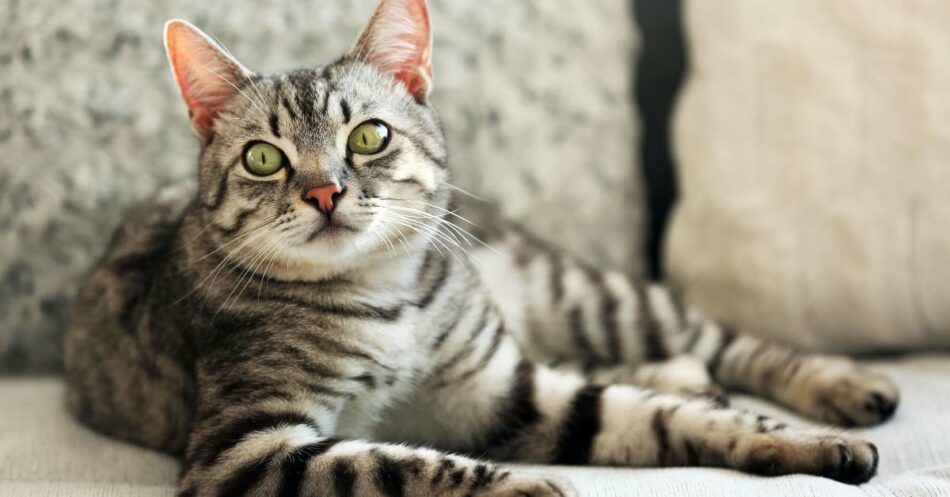
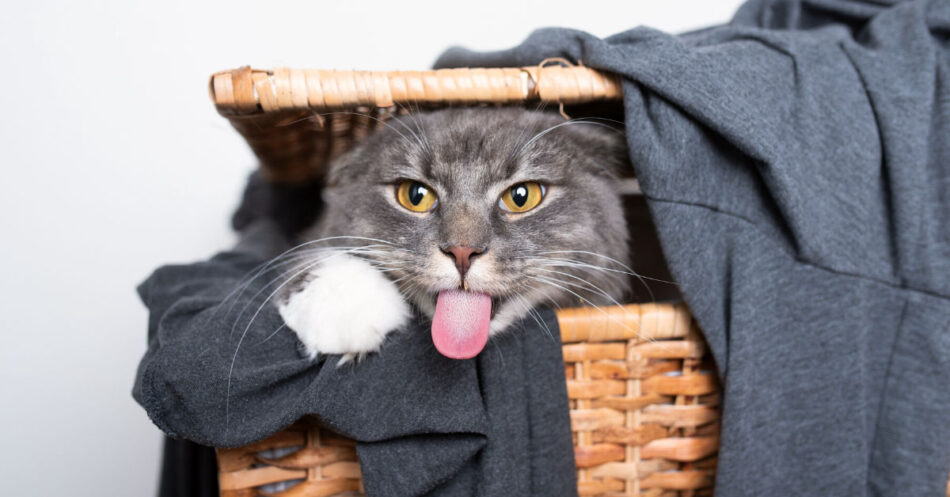
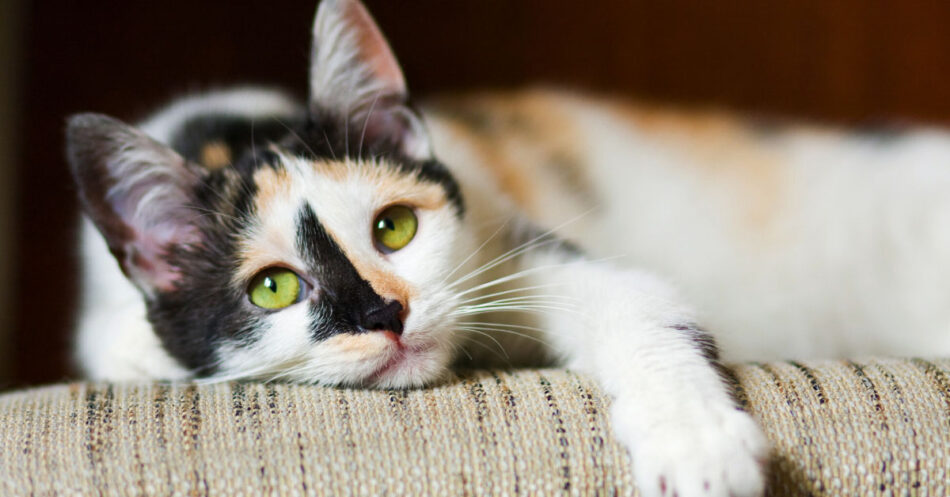
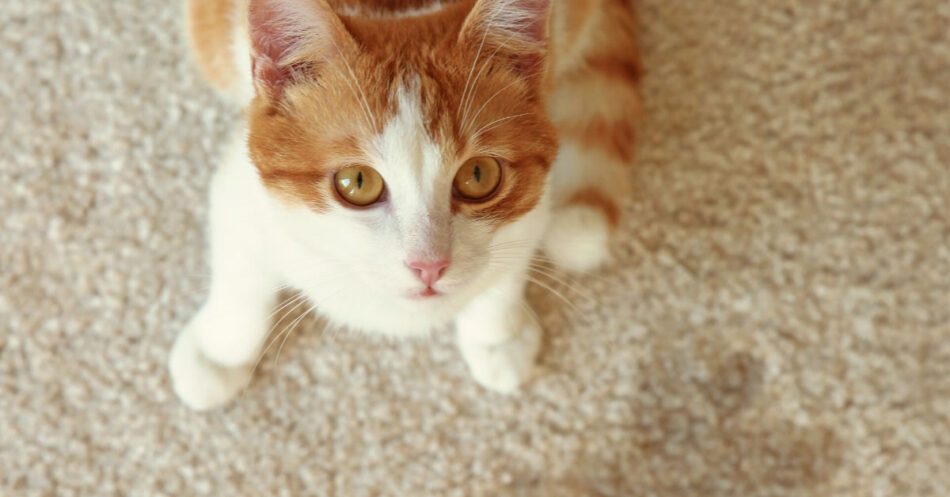
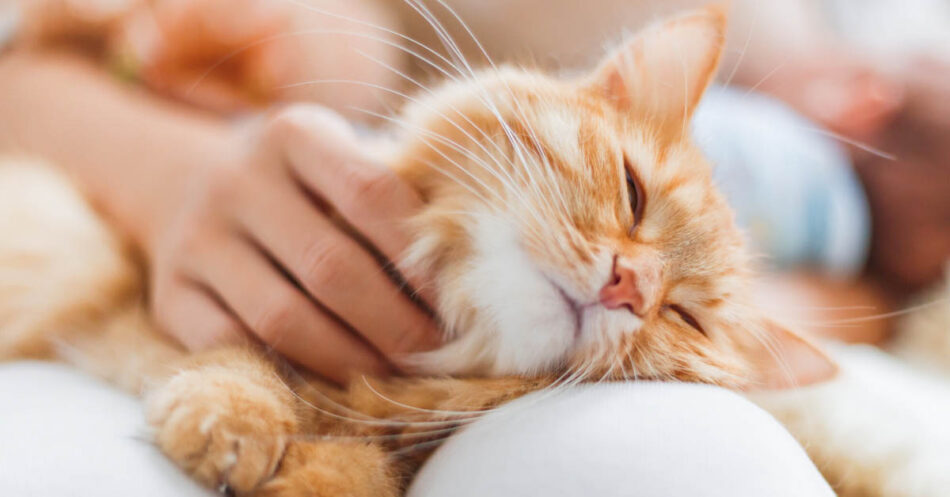
I have been having issues with my male adult cat for about a year now. He has been spraying since we got a new puppy but had to move and couldn’t keep the pup but my cat is continuing to spray. We now have a new kitten for him to play with. He is now spraying my things, also around the house and pinning the kitten trying to hump him. I have tried multiple litter boxes, sprays, cat nip for anxiety and even him staying in my room where he feels safe. I feel lost on how to help him. His behavior is getting worse. Please help!
Hi Tiffany,
I’m so sorry you’re dealing with that – I know how frustrating spraying can be!
Is your cat neutered? Many times, neutering a male cat will stop the spraying. You also may want to speak with your veterinarian to eliminate any medical reasons for the spraying. If it’s anxiety-related and home anxiety remedies aren’t helping, your vet can also help you with anxiety treatment options. Finally, making sure your cat’s favorite spraying areas are thoroughly cleaned with a pet enzymatic cleaner and then spraying it with a spray deterrent can help.
I hope things improve soon!
Wags,
Kristen